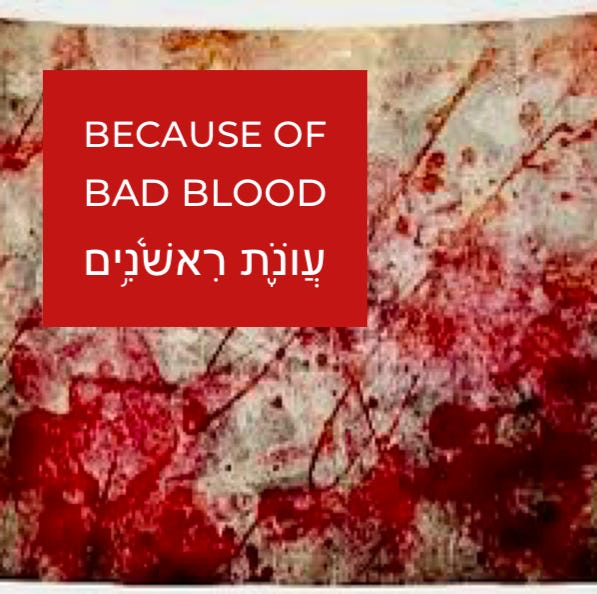Today’s psalm echoes the awful memories of Jerusalem’s destruction by Babylon, 2,600 years ago — detail by painful detail.
The laments meet us mid-summer during these three weeks of mourning for these ancient tragedies, and also as the current tragic war continues with no end in sight.
Verses like this one, beseeching God to redeem the captives of Zion are particularly painful:
תָּ֤ב֣וֹא לְפָנֶיךָ֮ אֶנְקַ֢ת אָ֫סִ֥יר כְּגֹ֥דֶל זְרוֹעֲךָ֑ ה֝וֹתֵ֗ר בְּנֵ֣י תְמוּתָֽה׃
Let the groans of those who are in shackles reach You; reprieve those condemned to death,as befits Your great strength.
Ps. 79:11
This psalm goes on to describe not only the aftermath and horrors of the destruction but also to disclose a crucial and complicated theological assertion -- that this tragedy didn’t just happen because of Babylonian political agendas. The biblical mindset of these authors clearly claims:
This tragedy happened because YHWH chose to punish Judea’s people for their wrongful actions:
כִּ֭י אָכַ֣ל אֶֽת־יַעֲקֹ֑ב וְֽאֶת־נָוֵ֥הוּ הֵשַֽׁמּוּ׃ אַֽל־תִּזְכׇּר־לָנוּ֮ עֲוֺנֹ֢ת רִאשֹׁ֫נִ֥ים מַ֭הֵר יְקַדְּמ֣וּנוּ רַחֲמֶ֑יךָ כִּ֖י דַלּ֣וֹנוּ מְאֹֽד׃
Yes, they have devoured Jacob
and desolated his sanctuary.
Do not hold our former iniquities against us;
let Your compassion come swiftly toward us,
for we have sunk very low.
Ps. 79:7-8
Regardless of what our modern concepts of divine existence or revenge may be — what does this text mean? What were the former iniquities referenced here?
Whoever the authors of this psalm were it would seem that what is hinted at here corresponds to other biblical texts that reference the destruction of the first temple - including the laments of Jeremiah and Ezekiel, as well as the chronicles in the Books of Kings.
The principle that arises here is that of ‘measure for measure’ or ‘an eye for an eye’.
We are guilty of bad blood and thus deserved what happened.
This psalm begins with the statement that the enemies defiled the temple -- and the same accusation is made of the Judeans in the 36th chapter of the Second Book of Chronicles - ‘The people defiled the temple in Jerusalem.”
The chilling phrase that is repeated here is “the spilled blood all through Jerusalem” - and this too seems to echo prior spilling of innocent blood - by the kings of Judea themselves.
In the 21st chapter of the Second Book of Kings, King Menashe of Jerusalem is accused of “spilling innocent blood from one end of Jerusalem to the other”, provoking divine wrath. A similar claim is made in the Scroll of Lamentations, accusing Jerusalem’s leaders of “spilling the blood of the righteous”, and both Jeremiah and Ezekiel echo similar accusations.
Ezekiel goes further to accuse Jerusalem of the shedding of innocent blood - thus incurring the divine punishment, in words that match the accusation in today’s chapter -- blood will be spilled and none will be left to bury the dead.
We may not share the biblical viewpoint that believes in ‘measure for measure’ as divine wrath and collective punishment.
But we can likely perceive the power of consequences to determine fate and determine destiny - even if bad blood takes many generations to catch up - and does not always do so, no matter how much justice we aspire to.
Was Jerusalem destroyed because of blood spilled by its own kings and rulers? Was it hatred that dehumanized the kingdom and enables its morality to crumble like its walls?
The poets whose words we are reading today seem to think so. How does this read to us, today?
It’s on us, today, with more blood spilling in the streets and on the battlefields of this ancient hurting land, with many to blame and many standing by, many suffering — to be aware of what the Scriptures tell us: There are consequences to violence, and there is a price to pay, when innocent blood is shed when it can be avoided - and when war is prioritized over peace.
Will we learn? The saying attributed to Gandhi comes to mind — ‘An eye for an eye leaves the whole world blind’.
Can our leaders learn to let go of past hurts and learn this crucial lesson?
Can we stop the blood?
During these days of lament we continue to hold this ancient -new pain, name the traumas and their long arc, and hopefully do what we can, each in our way, to protest, to demand a change, stop the bloodshed, release the captives, and plant the seeds of healing that will eventually enable us to let go of old bad blood and help us begin to release, with relief, and repair.
Below the Bible Belt: 929 chapters, 42 months, daily reflections.
Become a free or paid subscriber and join Rabbi Amichai’s 3+ years interactive online quest to question, queer + re-read between the lines of the entire Hebrew Bible. Enjoy daily posts, weekly videos and monthly learning sessions. 2022-2025.
Psalms #PSLAMS #Psalm79 #ספרתהילים #תהילים #BookofPsalms #כתובים #tehilim #Ketuvim #Hebrewbible #Tanach #929 #labshul #belowthebiblebelt929 #threthreeweeks #Jerusalem #retribution #Gandi #eyeforaneyeleavesusblind #badblood #eyeforaneye #theology #Karma #peace #prayforpeace #nomorewar #hope #everywhere #peaceispossible#endthewar #stoptheviolence #peace #prayforpeace #nomorewar #hope #everywhere #peaceispossible




I do hope so. And try as I might to follow the rule to treat my neighbor as myself , to forgive over and over again, to make peace the ultimate goal. Words even to say can Feel like broken glass in my mouth but I still look to the Lord and pray for that peace and strength of character